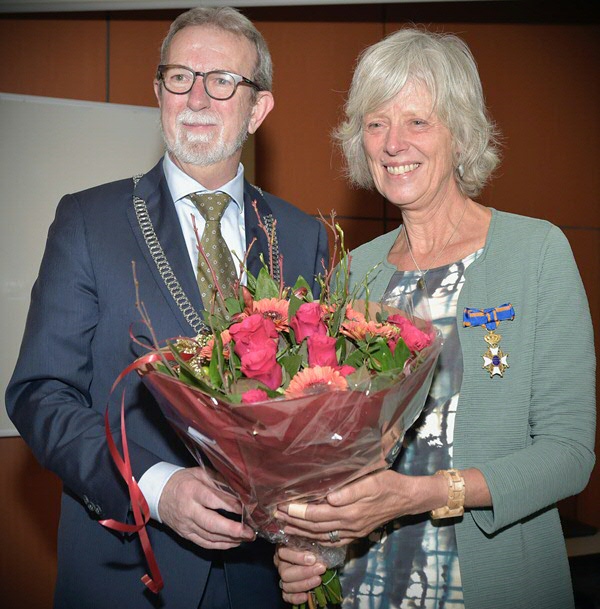Royal Decoration for Geny Groothuis

On Friday 10 March 2017 Prof. G.M.M. Groothuis received a Royal Decoration from M.A.P. Michels, Mayor of the Municipality of Winsum. She has been appointed a Knight in the Order of the Netherlands Lion.
The award ceremony will take place during the farewell symposium ‘Towards a more humane toxicology’ being held to celebrate her retirement in the Keuningzaal, Antonius Deusinglaan 1, Groningen.
Geny Groothuis (Groningen 1952), Professor of Drug Metabolism and Toxicology, is a brilliant, passionate scientist with an extensive national and international network. Her work is of particular social importance in that she has substantially reduced the need for experimental animals in medical and pharmaceutical research and teaching.
Reducing the use of experimental animals
A major innovation that Groothuis has devised for teaching purposes is the ‘Glassman Patient’, a glass model that shows how the human body works. Glass tubes of differing volumes are linked together by a pump, thus showing how processes actually take place in the body. The flasks represent the organs (stomach, liver, kidneys, etc.) and the pump represents the function of the heart. By administering a drug in one of the flasks you can measure the speed with which it is distributed to the various flasks. This can be influenced by varying the volume of the flasks or the pump speed. Experimental animals were used for this in the past, but that is now unnecessary, and this system works much better as an educational tool. It has reduced the number of experimental animals used in teaching from dozens to zero. Prof. Groothuis has been the driving force behind it.
This links up closely with Groothuis’s research, which also revolves around reducing the use of experimental animals. This is of scientific as well as social importance, since the results of research on experimental animals do not necessarily translate to humans. Within the Pharmacokinetics, Toxicology and Targeting Section she set up her own line of research into Drug Metabolism and Toxicology, an area that plays a decisive role in the development of new drugs. An important step here is developing techniques for detecting toxicity and undesirable drug metabolism at an early stage in the drug development process.
Human tissue left over after surgery
In this area Prof. Groothuis carried out ground-breaking international research into the use of human tissue left over after surgery, among other things. She developed the Precision-Cut Tissue Slice technique (PCTS), which involves cutting ultra-thin slices of human material (parts of the liver, intestines, kidneys and lungs) and keeping them alive for a lengthy period (one to three days). This enables the metabolism and toxicity of old and new drugs to be studied directly in human material. With this technique she has, in collaboration with the UMCG’s transplant team, also increased the shelf life of transplant organs, thus improving the results of transplants.
The PCTS technique is unique and has tremendous advantages: not only does it obviate the need to use experimental animals in pharmaceutical research, it also speeds up investigating the efficacy of new drugs, thus cutting the cost of development. This work has of course attracted great interest at home and abroad, ranging from the pharmaceutical industry to animal protection organizations. Its great importance has been recognized on several occasions in the various prizes that Groothuis has been awarded for this ground-breaking work. The technique is now accepted worldwide, and the FDA in the USA has even mentioned it in various guidelines.
Similar teaching of physicians and pharmacists
As a toxicologist Groothuis chairs the Drug Toxicology group of the Dutch Society of Toxicology and is a member of the Consilium Toxicologicum and the Supervisory Board for the national post-graduate Toxicology course. She is Director of the Medical Pharmaceutical Sciences Master’s degree programme, where she has gained particular merit by linking up the medical and pharmaceutical aspects of drug toxicology. Both professions - aspiring physicians and pharmacists - thus receive the same teaching in this area, facilitating communication later on. She is a role model for the advancement of women in science, having worked for many years to increase the numbers of female lecturers and professors at the University of Groningen.
| Last modified: | 14 April 2020 09.34 a.m. |
More news
-
16 April 2024
UG signs Barcelona Declaration on Open Research Information
In a significant stride toward advancing responsible research assessment and open science, the University of Groningen has officially signed the Barcelona Declaration on Open Research Information.
-
15 April 2024
Single-molecule engineering niche in Gravitation research
With her expertise in single-molecule techniques, Dr. Kasia Tych (GBB) will contribute to a big Grvitation-research programme
-
15 April 2024
Night vision with artificial atoms
Every two weeks, UG Makers puts the spotlight on a researcher who has created something tangible, ranging from homemade measuring equipment for academic research to small or larger products that can change our daily lives. That is how UG...
